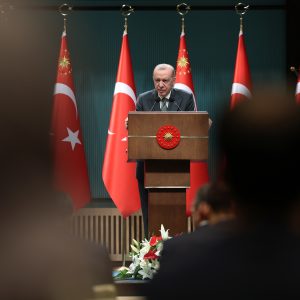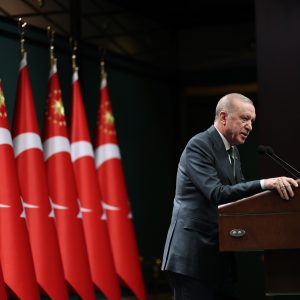War on Gaza pushing Israeli economy to recession, warns leading economist
ISTANBUL (AA) – A prominent economist says Israel is heading towards a recession because of the uncertainties surrounding its war on Gaza.
“I think that most chances are that this will be a recession and might be a deep recession too because the amount of uncertainty in our life is still there,” said Joseph Zeira, a professor of economics at the Hebrew University of Jerusalem.
Israel’s war on Gaza is about to enter its fourth month, having reduced large swathes of the Palestinian territory to rubble and more than 22,300 Palestinians dead, most of them women and children.
Despite growing international pressure, the Israeli leadership is refusing to end its deadly campaign, which many rights groups and experts have termed a textbook case of genocide.
Speaking to the media in a video interview, Zeira said the war’s impact on the Israeli economy is growing by the day, paving the way for 2024 to be “a recessionary year.”
“Overall, I think … domestic demand, tourism, purchases of big consumption items and most importantly, investment, these will go down and … (with) the rise in military costs … will make it a recessionary year.”
Tourism in Israel has already seen a major decline since October 7.
Between October 7 and October 19, more than 40% of flights to the country were canceled, while tourism activity in October was 76% lower than in October 2022.
In November 2023, only 38,000 tourists came to Israel — a sharp dip from about 370,000 in November 2022, according to Tourism Ministry data.
At the end of October, some 300 Israeli economists issued a stark warning to Prime Minister Benjamin Netanyahu and Finance Minister Bezalel Smotrich.
The economists, who included the former governor of the Bank of Israel, a Nobel laureate professor and former senior Finance Ministry officials, said the economy was facing a “difficult period,” stressing that “immediate measures need to be taken to prevent major damage.”
On October 9, the Bank of Israel also intervened in markets by selling $30 billion in an effort to moderate volatility in the shekel exchange rate.
– Signs of recession –
According to Zeira, the signs of a recession were already visible in 2023.
Months of unrest over the government’s controversial judicial overhaul plan had already impacted the economy. “So, it already had some elements of a recessionary effect, although we cannot tell and cannot estimate how big it was,” said the analyst.
This “definitely increased the risk for investors and it definitely started to reduce investments,” he added.
Zeira pointed out that similar economic situations were seen during previous bouts of Israel-Palestine tensions, such as the years of the first and second Intifadas.
Israel faced recessions during the First Intifada in 1989, followed by another in 1997 and 1999, and a “very long and very deep” recession during the Second Intifada from 2000 to mid-2004, he said.
There was a severe decline in investments during these periods, he said.
In wars with Palestinians, the civilian population is harmed, unlike the wars with Egypt or Syria that were far away, he said.
“These wars hurt the civilian population. Therefore, people go out less and when you go out less, you buy less,” he said.
The “rising risk” during a conflict particularly drags down investment levels, he said.
– Cost of war –
In Zeira’s assessment, the cost of Israel’s war on Gaza will be higher than the current projections.
The risks to the economy are “going to stay as long as we don’t make peace,” said Zeira.
“So, as long as Israel doesn’t go and make peace with the Palestinians once and for all, we’re going to lose a lot of money on a permanent basis. In addition to that, we’re going to lose a lot of money in the world because of the recession that has come,” he added.











